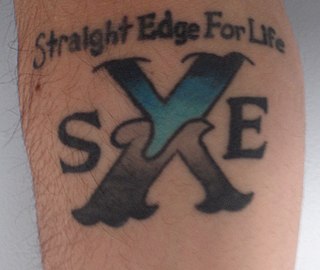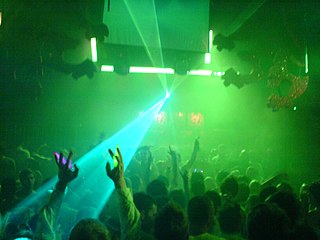Rock music is a broad genre of popular music that originated as "rock and roll" in the United States in the early 1950s, and developed into a range of different styles in the 1960s and later, particularly in the United Kingdom and in the United States. It has its roots in 1940s and 1950s rock and roll, a style which drew heavily on the genres of blues, rhythm and blues, and from country music. Rock music also drew strongly on a number of other genres such as electric blues and folk, and incorporated influences from jazz, classical and other musical styles. Musically, rock has centered on the electric guitar, usually as part of a rock group with electric bass, drums, and one or more singers. Usually, rock is song-based music usually with a 4/4 time signature using a verse–chorus form, but the genre has become extremely diverse. Like pop music, lyrics often stress romantic love but also address a wide variety of other themes that are frequently social or political.
Illinois, including Chicago, has a wide musical heritage. Chicago is most famously associated with the development of electric blues music. Chicago was also a center of development for early jazz and later for house music, and includes a vibrant hip hop scene and R&B. Chicago also has a thriving rock scene that spans the breadth of the rock genre, from huge stadium-filling arena-rock bands to small local indie bands. Chicago has had a significant historical impact on the development of many rock subgenres including power pop, punk rock, indie rock, emo rock, pop punk, and alternative rock.
Popular music of the United Kingdom in the 1980s built on the post-punk and new wave movements, incorporating different sources of inspiration from subgenres and what is now classed as world music in the shape of Jamaican and Indian music. It also explored the consequences of new technology and social change in the electronic music of synthpop. In the early years of the decade, while subgenres like heavy metal music continued to develop separately, there was a considerable crossover between rock and more commercial popular music, with a large number of more "serious" bands, like The Police and UB40, enjoying considerable single chart success. The advent of MTV and cable video helped spur what has been seen as a Second British Invasion in the early years of the decade, with British bands enjoying more success in America than they had since the height of the Beatles' popularity in the 1960s. However, by the end of the decade a fragmentation has been observed, with many new forms of music and sub-cultures, including Hip Hop and House music, while the single charts were once again dominated by pop artists, now often associated with the Hi-NRG hit factory of Stock Aitken Waterman. The rise of the Indie rock scene was partly a response to this, and marked a shift away from the major music labels and towards the importance of local scenes like Madchester and subgenres, like gothic rock.
Australian indie rock is part of the overall flow of Australian rock history but has a distinct history somewhat separate from mainstream rock in Australia, largely from the end of the punk rock era onwards.
Grebo was a short-lived subgenre of alternative rock that incorporated influences from punk rock, electronic dance music, hip hop and psychedelia. The scene occupied the period in the late 1980s and early 1990s in the United Kingdom before the popularisation of Britpop and grunge.

American rock has its roots in 1940s and 1950s rock and roll, rhythm and blues, and country music, and also drew on folk music, jazz, blues, and classical music. American rock music was further influenced by the British Invasion of the American pop charts from 1964 and resulted in the development of garage rock.
Indie pop is a music genre and subculture that combines guitar pop with DIY ethic in opposition to the style and tone of mainstream pop music. It originated from British post-punk in the late 1970s and subsequently generated a thriving fanzine, label, and club and gig circuit. Compared to its counterpart, indie rock, the genre is more melodic, less abrasive, and relatively angst-free. In later years, the definition of indie pop has bifurcated to also mean bands from unrelated DIY scenes/movements with pop leanings. Subgenres include chamber pop and twee pop.

Wacker Drive is a major multilevel street in Chicago, Illinois, running along the south side of the main branch and the east side of the south branch of the Chicago River in the Loop. The vast majority of the street is double-decked; the upper level intended for local traffic, and the lower level for through-traffic and trucks servicing buildings on the road. It is sometimes cited as a precursor to the modern freeway, though when it was built the idea was that pleasure vehicles would use the upper level. It is the only street in the city that is prefixed with all four cardinal directions, albeit on different parts of its route. The drive is named for early 20th century, Chicago businessman and city planner Charles H. Wacker.
Dance-punk is a music genre that emerged in the late 1970s, and is closely associated with the post-punk and new wave movements.
Post-punk revival is a genre of indie rock that developed in the late 1990s and early 2000s, inspired by the original sounds and aesthetics of garage rock of the 1960s and new wave and post-punk of the 1980s. Bands that broke through to the mainstream from local scenes across the world in the early 2000s included the Strokes, the Killers, Franz Ferdinand, The White Stripes, The Kooks, Interpol, Bloc Party, Arctic Monkeys and Kaiser Chiefs who were followed to commercial success by many established and new acts. By the end of the decade, most of the bands had broken up, moved on to other projects or were on hiatus, although some bands returned to recording and touring in the 2010s.
Wasted Youth was a hardcore punk band in the early 1980s from Los Angeles, California. The band followed in the footsteps of Black Flag and the Circle Jerks. It was a prominent and popular act among the Los Angeles punk underground. Other bands active in the early 1980s Los Angeles punk scene were The Adolescents, T.S.O.L., Social Distortion, Bad Religion, Agent Orange, and The Stains.
An independent music scene is a localized independent music-oriented community of bands and their audiences. Local scenes can play a key role in musical history and lead to the development of influential genres; for example, No Wave from New York City, Madchester from Manchester, and Grunge from Seattle.
The Thirsty Whale, which opened in 1975, was a rock and roll club at 8800 Grand Avenue, River Grove, Illinois. It brought in acts like Blue Öyster Cult, Molly Hatchet, Black Oak Arkansas, Extreme, Foghat, Johnny Winter, Mother Love Bone, and Peter Criss. Survivor performed here monthly early in their career.

The Empty Bottle is a bar and music venue located at 1035 N. Western Avenue in Chicago, Illinois. Located in Chicago's Ukrainian Village neighborhood, this has been one of the many venues for Chicago's alternative music scene. This venue hosts a variety of forms of music, ranging from indie-rock, punk, metal, rock'n'roll, hip-hop, electronic, experimental and jazz. This venue opened by Bruce Finkelman in 1992 was originally a simple neighborhood bar. In 1993 the club moved to its current location, two blocks from its original location. The venue also owns a connected restaurant next door called Bite Cafe. The Empty Bottle is open 7 days a week and hosts performances every night.

Chicago, Illinois is a major center for music in the midwestern United States where distinctive forms of blues, and house music, a genre of electronic dance music, were developed.

Straight edge is a subculture originated from hardcore punk whose adherents refrain from using alcohol, tobacco and other recreational drugs, in reaction to the excesses of punk subculture. For some, this extends to refraining from engaging in promiscuous sex, following a vegetarian or vegan diet or not using caffeine or prescription drugs. The term straight edge was adopted from the 1981 song "Straight Edge" by the hardcore punk band Minor Threat.

Bottom Lounge is a concert hall at 1375 W. Lake St. in Chicago, Illinois. Originally located in Chicago's Lake View neighborhood at 3206 N. Wilton, Bottom Lounge was acquired by the CTA in eminent domain in 2001 and seized for demolition in 2005 to make way for the Brown Line extension project. Hindered by lawsuits regarding the relocation and payment for Bottom Lounge under Uniform Relocation Act, Bottom Lounge re-opened at its current West Loop location in 2008. Live Nation began booking the venue in 2012.








